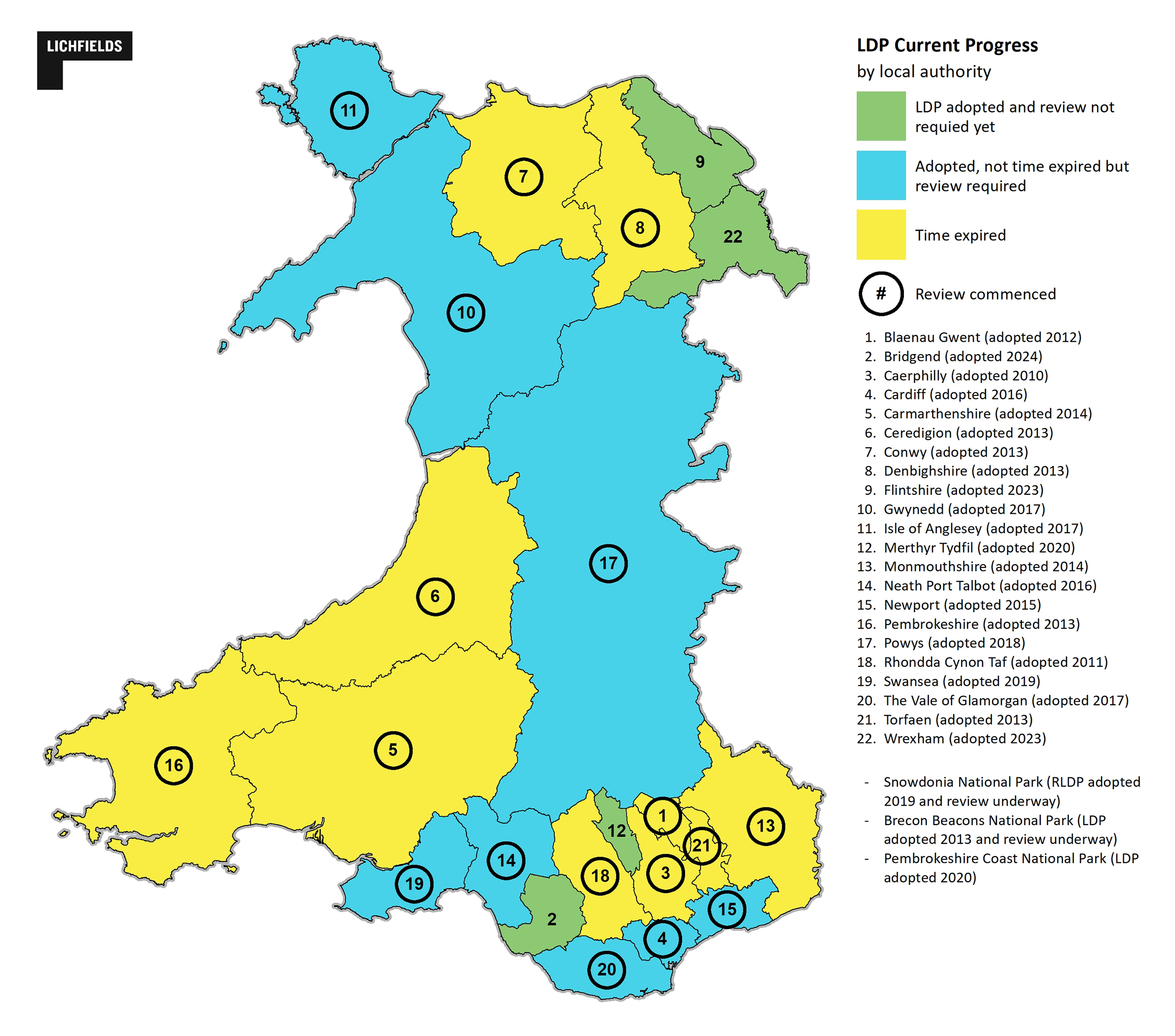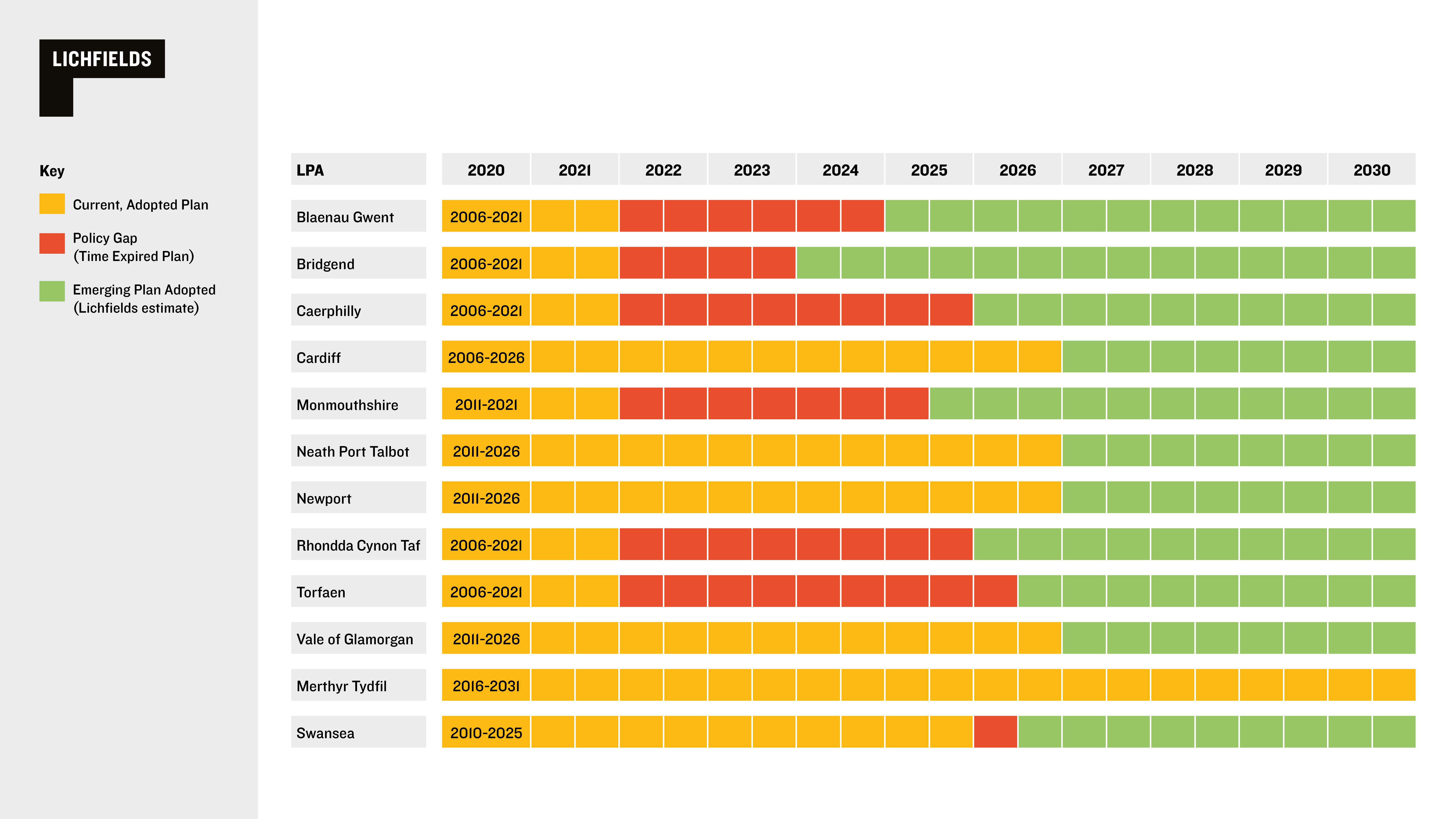Local Development Plans
The Welsh Government has repeatedly committed to a plan led system so that there is certainty about where development will happen. This should mean certainty for local authorities, local residents and developers alike. However, for this to be a reality there is a need for LDPs to be put in place in a timely manner and to remain up to date.
In the recent Senedd Plenary Short Debate: Fail to Plan, Plan to Fail, Minister for Climate Change Julie James MS concluded that:
…we have a complete coverage of development plans at national and local level allowing rational and consistent decision making, something we should celebrate.
Whilst at face value there is good plan coverage in Wales, this hides the fact that 50% of the 24 LDPs are time-expired so fail to provide an up-to-date assessment of development needs and how these should be met.

Regulation 41 of the Planning and Compulsory Purchase Act 2004 requires an LDP to be reviewed every 4 years from the date of adoption. As the Development Plans Manual highlights, beyond that the evidence base becomes dated
[1]. It goes on to say that maintaining an up-to-date LDP ensures effective and consistent planning decisions, supports the objectives of a plan-led system and minimises speculative development.
These time-expired plans may provide a continuing basis for development management decisions but are of little value in guiding much needed future investment for our local communities. The Development Plans Manual notes that replacement plans should be prepared in 3 ½ years with a single additional slippage period of 3 months. However, replacement plans are taking significantly longer but there are no repercussions for any such delays and the resultant lack of up-to-date plan coverage.
By way of example Caerphilly’s LDP expired in 2021 and the replacement LDP isn’t likely to be adopted until December 2025 at the earliest. This has created a period of great uncertainty in the county borough due to the lack of deliverable allocated sites. The replacement LDP review process should have commenced in 2014/15 and been adopted around 2019. Instead the process has stalled (partly for reasons outside its control) meaning the authority’s programme has slipped by six years and the current plan is four years past its end date.
This is not an isolated example as illustrated by the diagram below analysing LDP coverage across across South Wales:
Of the 12 LDPs in South Wales that are not time expired seven are within two years of their end date so there is little scope for any further slippage in replacement LDP preparation otherwise we could find ourselves in a position where less than half of the adopted LDPs in Wales are up to date.
Allocating land for new development is a politically fraught activity that is rarely welcomed by local communities. It is therefore unsurprising that LDP’s take such a long time to navigate their way through the review process. As LDPs age and allocations are taken up or fall away they shift in function from being documents that facilitate and guide growth to documents that by default primarily limit growth. LDPs must be living documents that plan actively to meet the country’s need for new infrastructure including jobs and homes.
LDPs provide the business plan for the development sector in Wales and it is essential that the planning system is more fleet of foot to respond to changing economic, social and environmental circumstances. A failure to keep plans up to date cannot be a reason to delay necessary ongoing investment in Wales including homes, jobs and energy infrastructure.
There needs to be a greater emphasis on delivering prompt LDP review, perhaps through the greater use of short-form reviews, but there also need to be mechanisms in place to ensure continuity in the supply of land to meet identified development needs where LDP reviews are stalling. The Welsh Government has been ready to regulate ahead of LDP review for those circumstances where development needs to be limited e.g. phosphates. It would be similarly helpful for active intervention where land supply limitations are stifling delivery of necessary development in appropriate locations. A policy mechanism should be brought into force to assist in prompt delivery where up to date LDP coverage is not in place.
As suggested by Jeremy Miles in his manifesto, consideration should be given to a simplified consenting regime for allocated development sites (especially given the detailed nature of the candidate site process). The burden of application requirements is expanding year on year raising costs and expanding timescales. Both of these factors further limit those able to engage in the development process particularly as development viability is already marginal across much of Wales. SME’s are least likely to be able to readily bear these burdens but ultimately these challenges are affecting all applicants, even householders.





